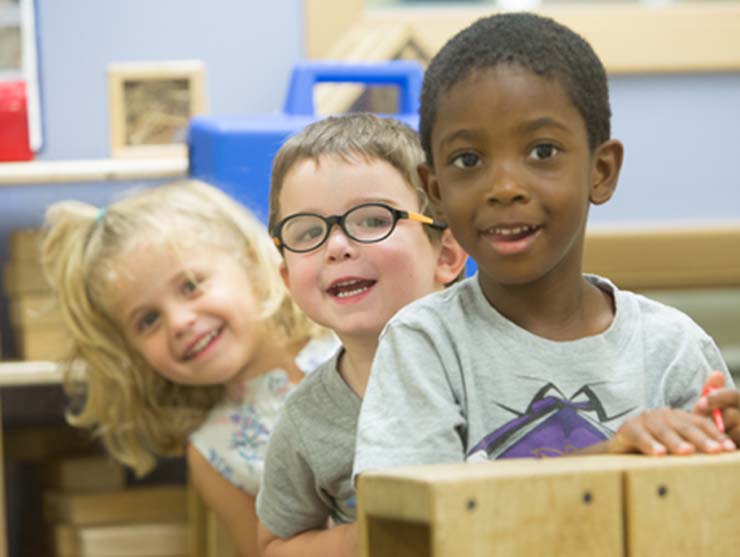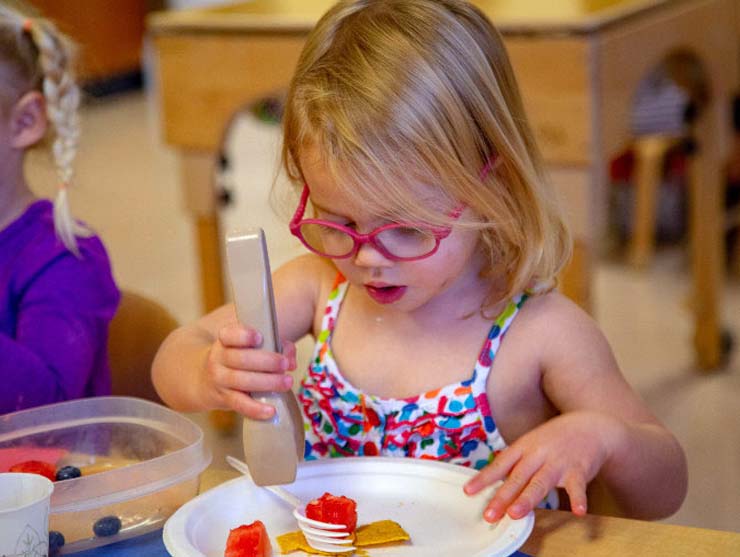Many early childhood schools and centers offer both preschool and pre-kindergarten, sometimes called “kindergarten prep” programs. Parents often ask “is preschool and pre-k the same?” and wonder if pre-kindergarten is necessary. A quality early childhood education is about providing a well-rounded curriculum that fosters whole-child growth and encourages children to communicate, collaborate, create, and think critically—skills children need that researchers have identified as essential for success in the 21st century. At Bright Horizons, our Discovery Driven Learning™ framework supports these crucial skills, fostering children’s confidence as they enter their future classrooms as explorers, discovers, and thinkers.
Both preschool and pre-k curriculums address children’s needs, but pre-kindergarten is distinct and separate from preschool. In this article, we cover the similarities and differences between preschool and pre-kindergarten to help you choose a program that’s right for your child.
How are preschool and pre-k the same?
Meaningful learning: Both preschool and pre-kindergarten classrooms in a high-quality program emphasize an emergent curriculum and approach: playful learning that is driven by the children’s interests and based on sound, age-appropriate practices; rooted in whole-child development. At these ages, children learn best through hands-on experiences, learning, and exploring. A typical day includes rich opportunities for pretend play, music, art, science, reading, and math activities.
Social-emotional growth: Relationships are at the heart of successful classrooms, regardless of age or stage. A quality pre-k or preschool education requires nurturing teachers who create safe environments where children can thrive. Taking on the role of co-researcher and co-learner, they teach social skills through daily interactions, mentoring, modeling, and even direct teaching, when appropriate.
How are preschool and pre-kindergarten different?
Ages and stages: One of the main differences between a preschool and a pre-kindergarten classroom is the age of the children and their developmental abilities. What age is preschool? Depending on state licensing regulations and enrollment needs, the preschool age range is typically from 2 ½ to 4 ½ years old; children in a pre-kindergarten class are generally 4 or 5 years old. While each child develops at his or her own pace, in general, children in a pre-kindergarten class engage in kindergarten readiness activities involving deeper learning and more structured skill building.
Focus on school readiness: School readiness skills are addressed in both preschool and pre-k curriculums, typically through group-time instruction and playful activities woven throughout the day. In a pre-kindergarten program, however, children are ready for more advanced learning and organized skill building. For example, in one pre-kindergarten classroom, the children became interested in agriculture after taking a field trip to a farm. With the teacher’s help, they collaborated to create a farm stand in the classroom. They made signs for the stand and used objects, such as pinecones and rocks, to represent produce. After the teacher read the story, “The Little Red Hen,” the children began acting the story out and eventually made simple costumes and put on a play. The children learned about and made a graph of oviparous (egg-laying) animals.
In addition to the learning that took place organically through this project, the children focused on kindergarten readiness by participating in structured pre-reading, writing, and math experiences throughout the day.
Why a pre-kindergarten education Is important
During the early preschool years, children develop vocabulary and language skills, are introduced to a wide variety of materials, and begin to learn skills, such as working with peers and collaborating on projects. By the time they reach the pre-kindergarten classroom, children dive deeper into Kindergarten readiness by continuing to build skills, and gain the confidence to work independently and use their skills to complete more in-depth projects with their peers.
Imagine their excitement and confidence as they work with peers to conduct science experiments, build bridges, and write and act out stories! Everything they do takes on a richer quality because they’re at the beginning stages of abstract thinking. They can find solutions to problems and take leadership roles in the classroom. Not only does a high-quality pre-kindergarten program prepare children academically for later school success, but it offers opportunities to build social-emotional skills and self-esteem; easing the transition to Kindergarten and offering a strong foundation for academic success.
Ready to Learn More?
Bright Horizons offers the support, environment, and curriculum designed to help your child thrive at every stage of their development.
If you’re ready to see how Bright Horizons can be the right fit for your family, we invite you to schedule a tour or learn more about our programs today.


.ashx?as=1)

